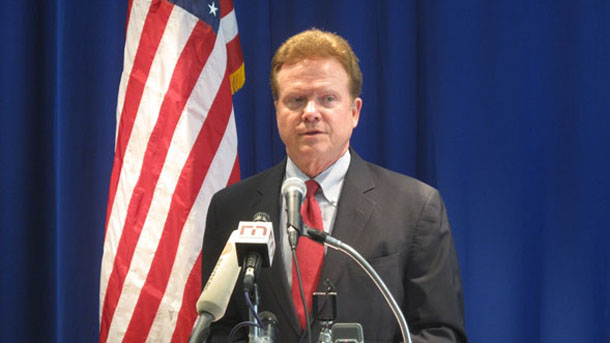WASHINGTON D.C.―The United States should open up trade relations with Burma to reward the Asian country for its democratic reforms, an influential senator said on Thursday.
Democratic Sen. Jim Webb told The Associated Press that it is important to support President Thein Sein’s “bold leap” in relaxing decades of authoritarian rule.
After opposition leader Aung San Suu Kyi’s party swept special elections this month, the Obama administration said it would ease restrictions on financial services and investment.
But tough US sanctions also bar imports from Burma into the US.
“In all of these situations there’s a moment in time you have to take advantage of,” said Webb, who visited Burma this month. “We should have some protections in there, but we should move forward on trade.”
Webb is a longtime advocate of increased US engagement with Burma, and in 2009, became the only US politician to meet with former junta leader Sen-Gen Than Shwe.
He pointed to substantive changes in Burma over the past year―more freedom for the media and political opposition parties, and the election to parliament of former political prisoner Suu Kyi, whose misfortunes had largely driven the imposition of sanctions in the first place.
“I think those sorts of gestures should be recognized,” he said.
Next week, officials say the European Union will suspend for one year most of its economic sanctions against the country, also known as Myanmar, and could include it on a list of nations with preferential access to the EU market.
Webb, who chairs a Senate panel overseeing US policy on East Asia and the Pacific, said he is calling a hearing next week with Obama administration officials discuss the practicalities of relaxing the myriad of overlapping sanctions.
Over the past three years, the administration has abandoned Washington’s two-decade isolation of the military-dominated country, and has said it will “meet action with action”―gradually easing sanctions to reciprocate the government’s reforms. On Tuesday, it eased financial sanctions to facilitate charity work by US groups, and is soon expected to nominate the first US ambassador to Burma since 1990.
While the US is likely to retain investment bans on business sectors such as those dealing with natural resources and precious stones perceived to be closely linked to the military, it is expected to allow investment in areas such as tourism, agriculture, telecommunications and banking.
Some Burma dissidents say it is too soon to allow investment, and fear if sanctions are lifted too fast, the government could drag its feet on further political reforms. The government still holds a number of political prisoners and the military is accused of continuing human rights abuses in ethnic minority areas.
Webb said it is important to create incentives for further reform as conservative elements linked to the former government are still nervous about the changes.
“You could go too slow and also encourage negative reactions,” he said.
Webb noted how Vietnam had benefited from the lifting of a US trade embargo as the former enemies resumed ties in the 1990s. However, he acknowledged that Vietnam, which remains a one-party state, “has a long way to go in terms of what we would like to see governmentally.”















